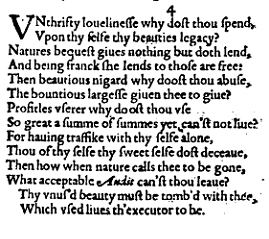 The word “traffic” is etymologically linked to “trade” and “commerce”, the passing of one object for another. In Italian, “tranfricare” means to rub across, touch repeatedly, handle.
The word “traffic” is etymologically linked to “trade” and “commerce”, the passing of one object for another. In Italian, “tranfricare” means to rub across, touch repeatedly, handle.
Why the sudden interest in “traffic”?
Shakespeare’s Sonnet #4:
For having traffic with thyself alone,
Thou of thyself thy sweet self dost deceive.
It doesn’t take much to understand what “traffic” means in this context. It’s an elegant substitution for “masturbation”. “Traffic” has action, sight and oh, can we imagine the sound too?
Good for Shakespeare! He was trying to get the young man to plant his seeds instead of wasting them; not one, two, three, but four sonnets now. How many more on this topic did he go on?
Definition of “traffic” from: http://www.etymonline.com

